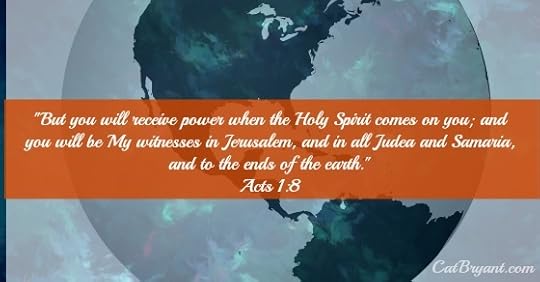Walk Through the Word – Acts 1-3

Join us as we walk together through the Word of God–to better know Him and make Him known, to gain strength for the journey as we grow in our faith, and to join our hearts in unity as the body of Christ.
Walk Through the WORD – Acts 1-3
Background:
Author – Luke (A doctor who also wrote the book of Luke.)
Main Theme – The early church and missionary campaigns
Passage:
Read: Acts 1:1-11
Key Points:
{vss. 1-2} Luke references his first book and begins with the same event with which he ended the book of Luke–the ascension of Christ. (See Luke 24:50-53.) He also points out the role of the Holy Spirit in Jesus’ instructions to the apostles (in this case, those who were sent out by God as messengers and witnesses of the resurrection). It’s important to remember that the same Holy Spirit works in and through believers today. Any lack of the Spirit’s power comes from our failure to completely surrender ourselves to Christ.
{vs. 3} Make no mistake about it. The cross was and is a place of suffering, which Jesus willingly endured to make a way for sinful man to return to holy God. But the main point of this verse is that after His resurrection, Jesus purposely showed Himself as proof that He was alive. We need this same proof today, not just for our own assurance, but as testimony to those who challenge Jesus as the Messiah and the living Son of God.
{vs. 4-5} Jesus left very specific instructions for His disciples. They were to stay in Jerusalem–among the very people who had crucified their Lord–until God’s gift of the Spirit immersed, soaked, and drenched them. In other words, Jesus’ followers were to wait. Is there anything more difficult for us than waiting on God to move and act? Waiting is made even more difficult for us in our get-it-now culture.
{vs. 6-7} True to human nature, the disciples began to question Jesus. Don’t we all want to know the answer to the question “When?” Jesus plainly tells them that God, in His Sovereignty, sets those dates. Instead of answering the “when?” question, Jesus answers the “Who?” question, by promising them the power of His Spirit. The Greek word for power is dunamis, where we get our word “dynamite.” This is the same power that raised Christ from the dead (Romans 8:11).
{vs. 8} This gift and privilege of the Spirit also brought with it the responsibility of being His witnesses–in their city, region, country, and world. How does this apply to us today? We are still His witnesses, both where we live and around the world. This verse reveals both our task and the extent of our task, so it’s very much worthy of our meditation and memorization. We should note that this massive and monumental task is nothing we can do on our own strength, but only through the dynamite power of God’s Spirit moving within us. Our job is to yield ourselves completely.
{vs. 9-11} After giving us the task of reaching the world with the great good news of Christ, Jesus ascended into heaven in a cloud. The same word for “cloud” in this passage is used in the story of the Exodus, as God led His people through the wilderness. It is the shekinah glory of God. When Jesus returns, He will come with clouds (Revelation 1:7). But the greatest news is that He will indeed return.

Read: Acts 1:12-26
Key Points:
{vss. 12-14} The eleven disciples returned to Jerusalem and an upstairs room where they were staying. Notice that in their obedient waiting they joined together in constant prayer. They were joined by the women who had played such a significant role in supporting Jesus’ ministry, as well as Mary the mother of Jesus, and His brothers.
{vss. 15-26} Peter had always been bold and brash, but now we see him portrayed in fresh light. Though he had denied Christ three times, in a post-resurrection appearance, Jesus gave him a three-fold opportunity to declare his love for Jesus and challenged Peter to feed His sheep (John 21:15-19). In this scene we see Peter doing just that. He quotes background scripture about Judas Iscariot and persuaded the men to choose a man to take Judas’ place among the disciples. They cast lots, and the task fell to Matthias. The miraculous change in Peter can only be contributed to the work of God.
Read: Acts 2:1-4
Key Points:
{vs. 1} For more information on Pentecost, see http://www.gotquestions.org/day-Pentecost.html . We know from Acts 1:13 that the disciples and others were staying in an upstairs room. Though it’s not specifically mentioned, it’s important to remember that in light of Christ’s crucifixion, they could have been wanted by authorities for similar treatment. For those of us who have lived in places where it isn’t popular to be a follower of Christ, we can well imagine this small group of believers clinging to one another for support and understanding.
{vs. 2} The word for “Spirit” is pneuma, from which we get our words “pneumonia” and “pneumatic.” It literally means breath. When God created Adam, He breathed life into him. So it is no surprise that this breath of God came with the sound of a mighty rushing wind. Notice that this wind filled the whole house. Our God is big!
{vs. 3-4} The Spirit is also described as being seen as tongues of fire that came to rest on each of them. They were immediately filled–not just touched–by the Spirit and began to speak in other languages or tongues, as God’s Spirit enabled them.
Read Acts 2:5-46.
Key Points:
{vs. 5-13} The Feast of Weeks was taking place in Jerusalem at this same time. Whether because of the holy days or because they lived there, there were many God-fearing Jews from around the world staying in Jerusalem. When they heard the noise of the rushing winds they quickly gathered. Each one could hear the words proclaimed by these believers in their own native language. Can you imagine the spectacle and amazement? Unfortunately–as is usually the case–there were scoffers among them, the sort of people who explain away and dismiss the miraculous.
{vs. 14-36} Here we get more glimpses into the miraculous change in Peter. He quickly denies the charges of drunkenness and once more quotes scripture to support what has just happened (Joel 2:28-32). If we’re not careful we’ll completely miss an important fact. It was true for these early believers, and it is true for us. We live in the time of “last days.” But as the passage in Joel so clearly points out, we are not alone. God’s Spirit is with us and in us. Peter then gets to the point. Those listening to his words were responsible for killing the very Son of God, but God raised Him from the dead. It was impossible for death to hold Him!!! He then quotes Psalm 16:8-11 and Psalm 110:1, the words of King David, and immediately points those scriptures to Christ and His resurrection. Then he points out that they are all witnesses to Jesus being alive and seated at the right hand of God as both Lord and Christ (Messiah, Savior).
{vs. 37-41} Can you imagine the heartbreak and fear of being confronted with the fact that you were responsible–either through your omission to help or your commission in carrying out the crucifixion–for the death of God’s Son, the Promised One, whom He sent save the world? The crowd was “cut to the heart” and asked what they needed to do. The answer Peter gave is the message we all should heed: “Repent and be baptized every one of you, in the name of Jesus Christ for the forgiveness of your sins.” Jesus was and is the only way to God. Repentance often gets a bad rap in our society today. In reality it is a good word and a good action, a turning ourselves away from the world and sin and back to the God who created us and loves us. The promise is for everyone! Peter pleaded with them. Notice the results of his message: About three thousand were added to their number. Sometimes today, churches place too much emphasis on numbers, as though keeping score in a competition. Folks, this isn’t about competition. It’s about winning souls and changing lives. In all truth, heaven rejoices over just one sinner who turns back to God (Luke 15:7).
The early church:
{vss. 42-43} This description of the early church is so compelling, but it is also convicting. There’s no doubt that the western church, in particular, has wandered far from this model. But I’m encouraged that the current chaotic state of our world seems to be impacting the American church for the better. Maybe it’s just the areas of gray receding, leaving only black or white from which to choose. As God’s followers and the body of Christ, we must devote ourselves to God’s Word, to the community of faith, and to prayer. When we get that right, I believe we will see God work among us in miraculous and mighty ways.
{vss. 44-45} We must remember that because of their commitment to Christ, these former Jews were often disinherited by their families, excommunicated by religious leaders, and even lost their means for survival. No wonder that they leaned so heavily on one another. They even sold their possessions and goods to help each other out as needs arose.
{vss. 46-47} They met together everyday in the temple courts. They ate meals together with glad and sincere hearts, praising God. (Is there anything like eating with someone to open up our hearts and lives to others?) As a result of this unity, the Lord daily added to their numbers. The lesson here for us? When we live out this model of the early church, people will be naturally drawn to the Lord. And if we had to sum up the early church with one word, it would come down to this: love (John 13:35).
Read Acts 3:1-26.
Key Points:
{vss. 1-10} In all truth, humans are born as beggars at the gate called Beautiful. We all need others to carry us to the only place capable of meeting our greatest need. It was no accident that the crippled beggar was carried to the gate as Peter and John walked by. It was by divine appointment. Like all beggars, we often think our greatest needs are material. This is evidenced by this particular beggar as he asked the two disciples for money. Peter first gets his attention, but rather than give him what he thinks he needs (money), he gives him what he truly needs (the ability to walk in the authority and power of Jesus). The man immediately praised God and rejoiced. (Think somersaults in the crowded temple courts.

Published on November 16, 2015 10:25
No comments have been added yet.
CatBryant.com ~ Journey Blog
FREE digital copy of A PATH LESS TRAVELED (2nd stand-alone book in the Miller's Creek novels and an Amazon Kindle Best-Seller) when you subscribe to Cathy's FROM MY FRONT PORCH newsletter. On my blog
FREE digital copy of A PATH LESS TRAVELED (2nd stand-alone book in the Miller's Creek novels and an Amazon Kindle Best-Seller) when you subscribe to Cathy's FROM MY FRONT PORCH newsletter. On my blog I write about life in general, though most of my posts tend to be book-related or devotional in nature. I'd love to have you drop by for a visit, where you can sign up for blog posts (via e-mail or RSS) Hope to see you at http://www.CatBryant.com!
...more
- Cathy Bryant's profile
- 390 followers



